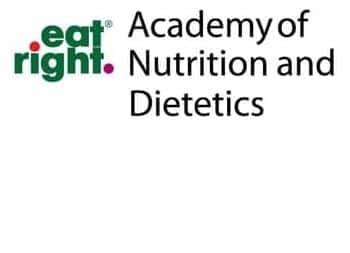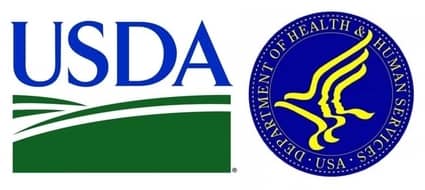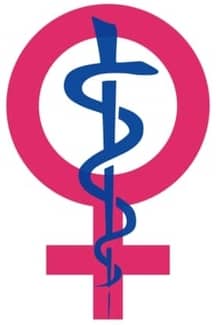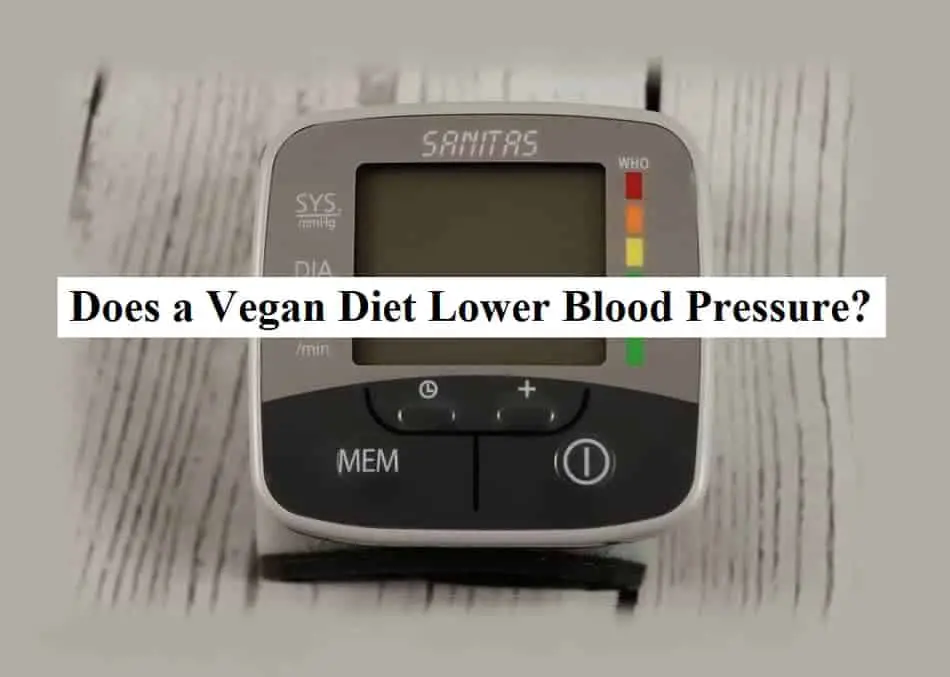It appears that vegetarian and vegan diets lower blood pressure. In the largest meta-analysis on the subject to date, Yokoyama et al. found vegetarian and vegan diets to be associated with a significant reduction in mean systolic BP and diastolic BP compared with the consumption of omnivorous diets.1
As you’ll see in the coming paragraphs, many of the studies were clinical trials, all of which found mean reductions in both systolic and diastolic BP.2-8
What’s the Expert Consensus on Vegan/Vegetarian Diets and Blood Pressure?
Academy of Nutrition and Dietetics (AND)

In a position paper on vegetarian and vegan diets put out by the Academy of Nutrition and Dietetics, the AND stated, “Vegetarians also appear to have lower low-density lipoprotein cholesterol levels, lower blood pressure, and lower rates of hypertension and type 2 diabetes than nonvegetarians.”9
USDA and HHS

The U.S. Department of Agriculture and U.S. Department of Health and Human Services stated in the 2010 Dietary Guidelines for Americans that vegetarian diets and eating patterns have been associated with a reduction in blood pressure, as well as lower rates of obesity and cardiovascular disease.10
The report attributed said effects to vegetarians’:10
- Lower energy intake
- Lower intakes of saturated fat
- Higher intakes of fiber
- Higher intakes of certain micronutrients—namely, potassium, and vitamin C.
- Their generally lower body mass index
This particular edition of the Dietary Guidelines for Americans included vegan and lacto-ovo adaptations of the USDA Food Patterns.
Existing Evidence for Plant-Based Diets in Lowering Blood Pressure
Cross-Sectional Studies
There are three cross-sectional studies that are noted to have a large number of vegetarian participants.11
These include:
- The UK Women’s Cohort Study with 29% of its participants being vegetarian.12
- The Adventist Health Study-2 at 36%.13
- The European Prospective Investigation into Cancer and Nutrition-Oxford (EPIC-Oxford) at 33%.14
1) UK Women’s Cohort

First, we have the UK Women’s Cohort Study which looked at the relationships between diet, cancer incidence, and rates of mortality among women aged 35–69 years, the United Kingdom.12
In this study, the prevalence of hypertension was compared between omnivores and vegetarians in a population of ~35,000 women living in England, Scotland, and Wales.12
While those identifying as vegetarians tended to share many non-dietary factors that would be expected to be associated with lower blood pressure (e.g. they were less likely to report excessive alcohol consumption and were, on average, younger in age), nutrient analysis showed the vegetarian group to have many dietary practices that could account for the lower BP levels observed.
Namely, the vegetarian group:12
- Had a lower total energy intake and lower mean BMI (23.3 vs. 25.0 kg/m2)
- Acquired a higher percentage of their kcal carbohydrates
- Higher fiber intakes
- Higher intakes of micronutrients thought to help with blood pressure regulation (calcium, iron, folate, and vitamin C
- Lower total and saturated fat intakes.
2) Adventist Health Study 2

The AHS-2 cohort study was made up of more than 96,000 Seventh-Day Adventist (SDA) members from the US and Canada between.13
Anyway, this cohort involved a calibration stub-study for the purposes of evaluating accuracy of data collection/reporting, wherein the researchers used a validated FFQ (food frequency questionnaire).
In this calibration cohort, BP values taken and compared per dietary pattern among 500 participants, with a mean age of 62.7 years.13
The researchers found those consuming a “vegan” diet (with fish, meat, and dairy products consumed no more than once per month to have a lower prevalence of high blood pressure—defined by the hypertension threshold of BP > 139 mm Hg over BP > 89 mm Hg, and/or taking prescribed HTN medications such as beta blockers, etc.—compared those consuming omnivorous diets.13
In this study, it seems most BP benefits went to vegans. While vegetarians (ovolactovegetarians) were also shown to have a lower estimated odds of having high BP compared to omnivores, adjustment for BMI rendered the differences to be no longer statistically significant.
I.e. the effect of vegetarian diets (compared to omnivorous diets) seemed to be, in part, mediated by the effect of diet on body weight/BMI.13
3) EPIC-Oxford

The EPIC-Oxford cohort was made up of 57,500 British men and women, with BP being elevated in 6873 of the men, and 1790 of the women.14
Subjects were split into four diet groups based on dietary, meat, fish, and egg consumption.
Yet again, vegans took the prize for the lowest systolic and diastolic BPs. The differences were only significant when BMI wasn’t controlled for, so it seems the BP lowering effects of the vegan diet were, at least in part, conferred by the effect of the vegan diet on body weight.14
In the above three studies, we can be fairly certain that the protective effects associated with the vegetarian and vegan diet groups were, in fact, due to differences in dietary patterns—given the fact that age, socioeconomic status (SES), and other factors were controlled for.
For example, in all three studies, the nonvegetarians were used as a comparison group, being drawn from the same population so as to have similar SES factors to those of the targeted vegetarians.
Measures like this reduce the likelihood that the health effects observed would be due to non-dietary lifestyle factors such as educational achievement and physical activity levels.
BMI seemed to be highly significant in the above results, at least for two of the studies. Which is great as far as I’m concerned. We’ve long known vegan diets to be associated with lower BMI levels, so it makes sense that bodyweight might underpin many of the health benefits associated with 100% plant-based diets.
As you know by now, cross-sectional studies can’t be used to infer causality. However, these findings more than suggest the existence of long-term health effects associated with vegetarian and vegan diets.
Meta-Analysis of 32 Cross-Sectional Studies
The meta-analysis by Yokoyama et al included 32 observational studies (all cross-sectional) which covered 21,604 subjects. Participants were 28-68 years old with a mean age of 46 years.1,13-44
The aforementioned studies were included (UK Cohort, EPIC-Oxford, and AHS-2)
Five studies focused specifically on vegan diets, while others were focused on mixed diets and other variants of vegetarian diet patterns.21,24,30,34,38
In this analysis, those following vegetarian diets were observed to have a reduced mean systolic BP (−6.9 mmHg).1
Yokoyama, et al. found the association between vegetarian diet patterns and BP to be particularly strong among men and in participants with higher baseline BP values.1
Meta-Analysis of Clinical Trials
Now, we’re cooking with oil! (not too much because oils are easily oxidized under heat). But seriously, observational studies are great, but clinical trials and diet interventions are where we are able to confirm causality.
This same meta-analysis (Yokoyama et al.) included seven trials having a total of 311 participants.1,2-8
Vegan diets were studied in two of the trials.7,8
All seven trials were open controlled trials conducted from 6 to 52 weeks, with a mean of 15.7 weeks.
What did they find?
Compared to omnivorous diets, a vegetarian diet was associated with mean reductions of −4.8 mmHg and −2.2 mmHg in systolic BP and diastolic BP, respectively.1
These findings are consistent with a prior review by Berkow and Bernard in 2005. In their review, randomized controlled trials (RCTs) showed BP to be lower upon replacing animal products with plant-based products in both hypertensive and normotensive subjects.45
These findings are also consistent with those found by Appel et al. in studying the effects of the DASH diet (The Dietary Approaches to Stop Hypertension) on BP.46
The DASH study was, in part, based on the observation that vegetarian diets tend to be associated with a significantly lower risk of developing hypertension compared with omnivorous diets.47
It found diets rich in fruits and veggies to reduce BP by 5.5 mmHg and 3 mmHg for systolic and diastolic BP, respectively.46
Summary
The above should give you a good idea of the existing evidence for the efficacy of vegetarian and vegan diets in reducing blood pressure.
Keep in mind, the above are only the most well-known studies that have helped shape the expert consensus on plant-based diets in blood pressure regulation.
There are many more where that came from. I decided not to cover all, because the remaining studies tend to show similar results, so it would be pretty redundant to cover every last piece of evidence.
But, for those of you who are curious, you can check out the following:
- A cross-sectional study in India which looked at 6555 participants, both omnivorous and lacto-ovo-vegetarians. Diastolic BP was found to be significantly lower in the vegetarian group in this study.48
- A study by Chuang, et al looking at 3423 omnivores and 686 vegetarians. In this study, vegetarians had lower systolic and diastolic BP.49
Anyway, that wraps it up for now. Look out for another article on plant-based diets and BP as I’ll be writing one on specific aspects and food components of vegetarian and vegan diets that make plant-based dietary patterns anti-hypertensive. Specific foods you should incorporate into your diet, etc.
Until next time.
References
- Yokoyama, Y., Nishimura, K., Barnard, N.D., Takegami, M., Watanabe, M., Sekikawa, A., Okamura, T., Miyamoto, Y., 2014. Vegetarian diets and blood pressure: a meta-analysis. JAMA Intern. Med. 174, 577–587.
- Rouse, I.L., Beilin, L.J., Armstrong, B.K., Vandongen, R., 1983b. Blood-pressure-lowering effect of a vegetarian diet: controlled trial in normotensive subjects. Lancet 1 (8314–5), 5–10.
- Margetts, B.M., Beilin, L.J., Vandongen, R., Armstrong, B.K., 1986. Vegetarian diet in mild hypertension: a randomised controlled trial. Br. Med. J. (Clin. Res. Ed.) 293 (6560), 1468–1471.
- Hakala, P., Karvetti, R.L., 1989. Weight reduction on lactovegetarian and mixed diets. Changes in weight, nutrient intake, skinfold thicknesses and blood pressure. Eur. J. Clin. Nutr. 43 (6), 421–430.
- Kestin, M., Rouse, I.L., Correll, R.A., Nestel, P.J., 1989. Cardiovascular disease risk factors in free-living men: comparison of two prudent diets, one based on lactoovovegetarianism and the other allowing lean meat. Am. J. Clin. Nutr. 50 (2), 280–287.
- Sciarrone, S.E., Strahan, M.T., Beilin, L.J., Burke, V., Rogers, P., Rouse, I.L., 1993. Biochemical and neurohormonal responses to the introduction of a lacto-ovovegetarian diet. J. Hypertens. 11 (8), 849–860.
- Nicholson, A.S., Sklar, M., Barnard, N.D., Gore, S., Sullivan, R., Browning, S., 1999. Toward improved management of NIDDM: a randomized, controlled, pilot intervention using a lowfat, vegetarian diet. Prev. Med. 29 (2), 87–91.
- Ferdowsian, H.R., Barnard, N.D., Hoover, V.J., et al., 2010. A multicomponent intervention reduces body weight and cardiovascular risk at a GEICO corporate site. Am. J. Health Promot. AJHP 24 (6), 384–387.
- Craig WJ and Mangels AR. Position of the American Dietetic Association: vegetarian diets. J Am Diet Assoc. 2009;109(7):1266-82.
- USDA (U.S. Department of Agriculture) and HHS (U.S. Department of Health and Human Services). 2010. Dietary Guidelines for Americans, 2010. 7th ed. Washington, DC: U.S. Government Printing Office.
- Appleby, P.N., Key, T.J., 2015. The long-term health of vegetarians and vegans. Proc. Nutr. Soc. 1–7.
- Cade, J.E., Burley, V.J., Greenwood, D.C., 2004. Group UK Women’s cohort study sterring group. The UK Women’s cohort study: comparison of vegetarians, fish-eaters and meat-eaters. Public Health Nutr. 7 (7), 871–878.
- Pettersen, B.J., Anousheh, R., Fan, J., Jaceldo-Siegl, K., Fraser, G.E., 2012. Vegetarian diets and blood pressure among white subjects: results from the Adventist Health Study-2 (AHS-2). Public Health Nutr. 15 (10), 1909–1916.
- Appleby, P.N., Davey, G.K., Key, T.J., 2002. Hypertension and blood pressure among meat eaters, fish eaters, vegetarians and vegans in EPIC-Oxford. Public Health Nutr. 5 (5), 645–654.
- Armstrong, B., Clarke, H., Martin, C., Ward, W., Norman, N., Masarei, J., 1979. Urinary sodium and blood pressure in vegetarians. Am. J. Clin. Nutr. 32 (12), 2472–2476.
- Haines, A.P., Chakrabarti, R., Fisher, D., Meade, T.W., North, W.R., Stirling, Y., 1980. Haemostatic variables in vegetarians and non-vegetarians. Thromb. Res. 19 (1–2), 139–148.
- Burr, M.L., Bates, C.J., Fehily, A.M., St Leger, A.S., 1981. Plasma cholesterol and blood pressure in vegetarians. J. Hum. Nutr. 35 (6), 437–441.
- Rouse, I.L., Armstrong, B.K., Beilin, L.J., 1983a. The relationship of blood pressure to diet and lifestyle in two religious populations. J. Hypertens. 1 (1), 65–71.
- Ophir, O., Peer, G., Gilad, J., Blum, M., Aviram, A., 1983. Low blood pressure in vegetarians: the possible role of potassium. Am. J. Clin. Nutr. 37 (5), 755–762.
- Wiseman, M.J., Hunt, R., Goodwin, A., Gross, J.L., Keen, H., Viberti, G.C., 1987. Dietary composition and renal function in healthy subjects. Nephron 46 (1), 37–42.
- Sanders, T.A., Key, T.J., 1987. Blood pressure, plasma renin activity and aldosterone concentrations in vegans and omnivore controls. Hum. Nutr. Appl. Nutr. 41 (3), 204–211.
- Melby, C.L., Goldflies, D.G., Hyner, G.C., Lyle, R.M., 1989. Relation between vegetarian/nonvegetarian diets and blood pressure in black and white adults. Am. J. Public Health 79 (9), 1283–1288.
- Melby, C.L., Toohey, M.L., Cebrick, J., 1994. Blood pressure and blood lipids among vegetarian, semivegetarian, and nonvegetarian African Americans. Am. J. Clin. Nutr. 59 (1), 103–109.
- Orlov, S.N., Agren, J.J., Hanninen, O.O., et al., 1994. Univalent cation fluxes in human erythrocytes from individuals with low or normal sodium intake. J. Cardiovasc. Risk 1 (3), 249–254.
- Wyatt, C.J., Velazquez, C., Grijalva, I., Valencia, M.E., 1995. Dietary-intake of sodium, potassium and bloodpressure in lacto-ovo-vegetarians. Nutr. Res. 15 (6), 819–830.
- Williams, P.T., 1997. Interactive effects of exercise, alcohol, and vegetarian diet on coronary artery disease risk factors in 9242 runners: the National Runners’ Health Study. Am. J. Clin. Nutr. 66 (5), 1197–1206.
- Harman, S.K., Parnell, W.R., 1998. The nutritional health of New Zealand vegetarian and non-vegetarian Seventh-day Adventists: selected vitamin, mineral and lipid levels. N. Z. Med. J. 111 (1062), 91–94.
- Famodu, A.A., Osilesi, O., Makinde, Y.O., Osonuga, O.A., 1998. Blood pressure and blood lipid levels among vegetarian, semi-vegetarian, and non-vegetarian native Africans. Clin. Biochem. 31 (7), 545–549.
- Lu, S.C., Wu, W.H., Lee, C.A., Chou, H.F., Lee, H.R., Huang, P.C., 2000. LDL of Taiwanese vegetarians are less oxidizable than those of omnivores. J. Nutr. 130 (6), 1591–1596.
- Goff, L.M., Bell, J.D., So, P.W., Dornhorst, A., Frost, G.S., 2005. Veganism and its relationship with insulin resistance and intramyocellular lipid. Eur. J. Clin. Nutr. 59 (2), 291–298.
- Su, T.C., Jeng, J.S., Wang, J.D., et al., 2006. Homocysteine, circulating vascular cell adhesion molecule and carotid atherosclerosis in postmenopausal vegetarian women and omnivores. Atherosclerosis 184 (2), 356–362.
- Sebekova, K., Boor, P., Valachovicova, M., et al., 2006. Association of metabolic syndrome risk factors with selected markers of oxidative status and microinflammation in healthy omnivores and vegetarians. Mol. Nutr. Food Res. 50 (9), 858–868.
- Teixeira Rde, C., Molina Mdel, C., Zandonade, E., Mill, J.G., 2007. Cardiovascular risk in vegetarians and omnivores: a comparative study. Arq. Bras. Cardiol. 89 (4), 237–244.
- Fontana, L., Meyer, T.E., Klein, S., Holloszy, J.O., 2007. Long-term low-calorie low-protein vegan diet and endurance exercise are associated with low cardiometabolic risk. Rejuvenation Res. 10 (2), 225–234.
- Slavicek, J., Kittnar, O., Fraser, G.E., et al., 2008. Lifestyle decreases risk factors for cardiovascular diseases. Cent. Eur. J. Public Health 16 (4), 161–164.
- Nakamoto, K., Watanabe, S., Kudo, H., Tanaka, A., 2008. Nutritional characteristics of middle-aged Japanese vegetarians. J. Atheroscler. Thromb. 15 (3), 122–129.
- Pitla, S., Nagalla, B., 2009. Gender-related differences in the relationship between plasma homocysteine, anthropometric and conventional biochemical coronary heart disease risk factors in middle-aged Indians. Ann. Nutr. Metab. 54 (1), 1–6.
- Lin, C.K., Lin, D.J., Yen, C.H., et al., 2010. Comparison of renal function and other health outcomes in vegetarians versus omnivores in Taiwan. J. Health Popul. Nutr. 28 (5), 470–475.
- Yang, S.Y., Zhang, H.J., Sun, S.Y., et al., 2011. Relationship of carotid intima-media thickness and duration of vegetarian diet in Chinese male vegetarians. Nutr. Metab. (Lond) 8 (1), 63.
- Rodenas, S., Sanchez-Muniz, F.J., Bastida, S., Sevillano, M.I., Larrea Marin, T., Gonzalez-Munoz, M.J., 2011. Blood pressure of omnivorous and semi-vegetarian postmenopausal women and their relationship with dietary and hair concentrations of essential and toxic metals. Nutr. Hosp. 26 (4), 874–883.
- Fernandes Dourado, K., de Arruda Camara, E.S.C.F., Sakugava Shinohara, N.K., 2011. Relation between dietary and circulating lipids in lacto-ovo vegetarians. Nutr. Hosp. 26 (5), 959–964.
- Chen, C.W., Lin, C.T., Lin, Y.L., Lin, T.K., Lin, C.L., 2011. Taiwanese female vegetarians have lower lipoprotein- associated phospholipase A2 compared with omnivores. Yonsei Med. J. 52 (1), 13–19.
- Yang, S.Y., Li, X.J., Zhang, W., et al., 2012. Chinese lacto-vegetarian diet exerts favorable effects on metabolic parameters, intima-media thickness, and cardiovascular risks in healthy men. Nutr. Clin. Pract. 27 (3), 392–398.
- Kim, M.H., Bae, Y.J., 2012. Postmenopausal vegetarians’ low serum ferritin level may reduce the risk for metabolic syndrome. Biol. Trace Elem. Res. 149 (1), 34–41.
- Berkow, S.E., Barnard, N.D., 2005. Blood pressure regulation and vegetarian diets. Nutr. Rev. 63 (1), 1–8.
- Appel, L.J., Moore, T.J., Obarzanek, E., et al., 1997. A clinical trial of the effects of dietary patterns on blood pressure. DASH Collaborative Research Group. N. Engl. J. Med. 336 (16), 1117–1124.
- Sacks, F.M., Obarzanek, E., Windhauser, M.M., et al., 1995. Rationale and design of the Dietary Approaches to Stop Hypertension trial (DASH). A multicenter controlled-feeding study of dietary patterns to lower blood pressure. Ann. Epidemiol. 5 (2), 108–118.
- Shridhar, K., Dhillon, P.K., Bowen, L., et al., 2014. The association between a vegetarian diet and cardiovascular disease (CVD) risk factors in India: the Indian Migration Study. PLoS One 9 (10), e110586.
- Chuang, S.Y., Chiu, T.H., Lee, C.Y., et al., 2016. Vegetarian diet reduces the risk of hypertension independent of abdominal obesity and inflammation: a prospective study. J. Hypertens. 34 (11), 2164–2171.

